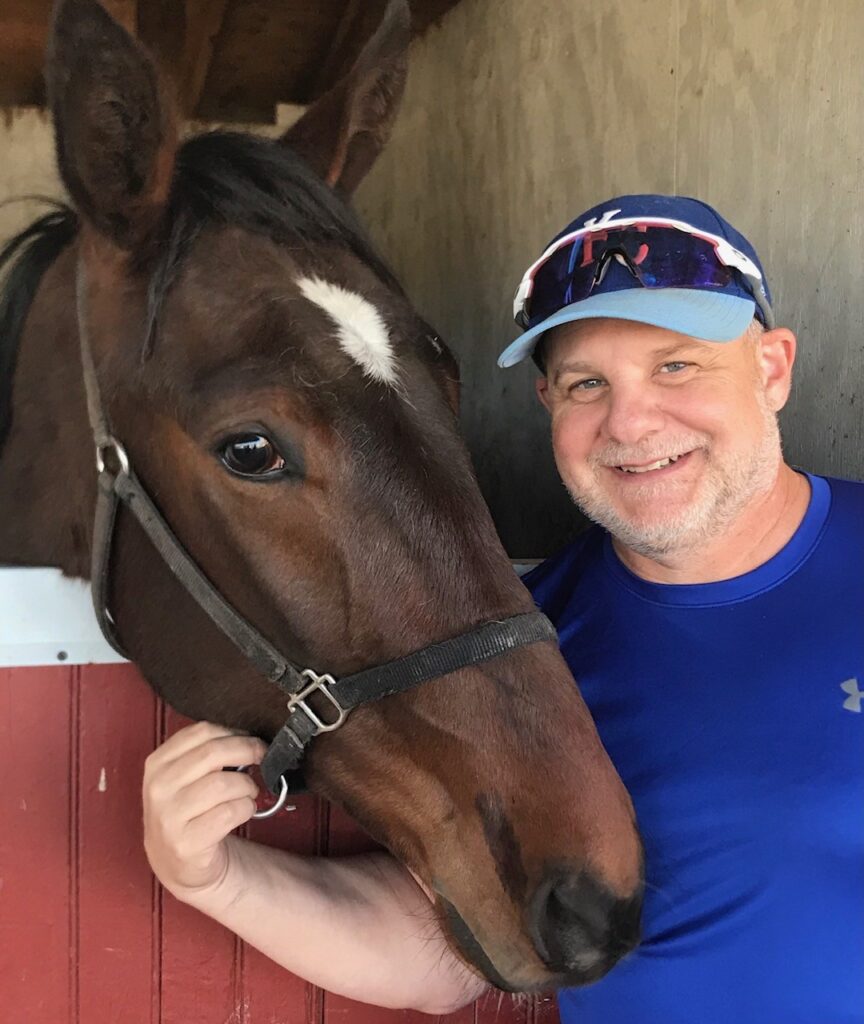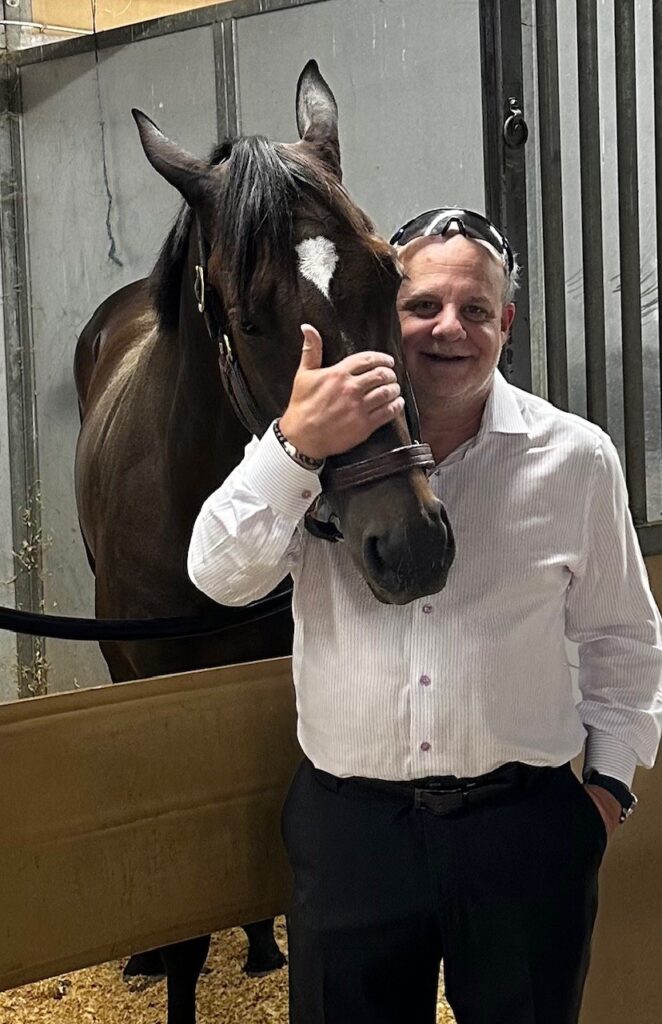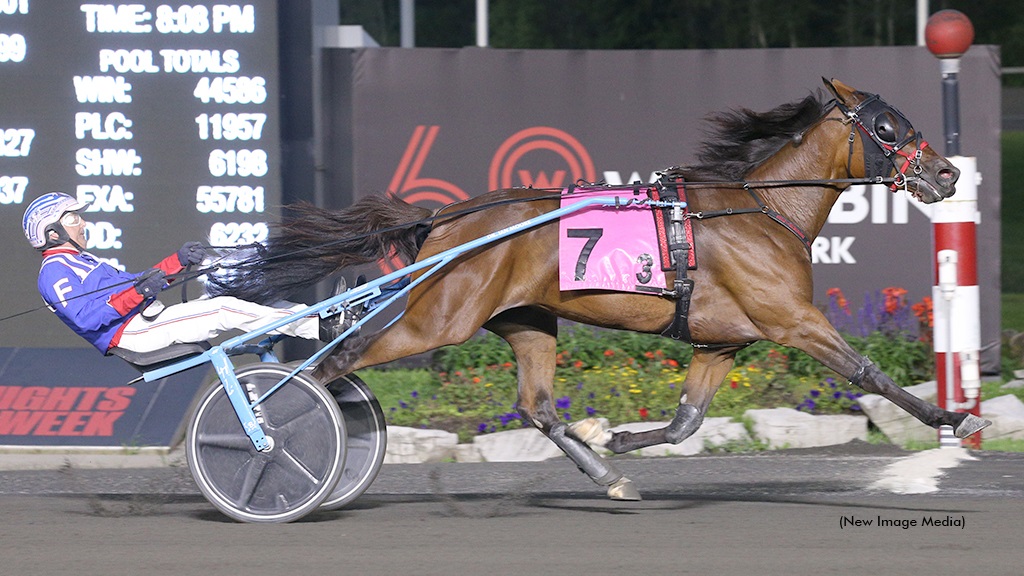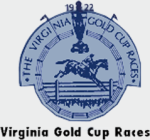When retired Virginia small animal veterinarian Adam Ainspan purchased his first racehorse 22 years ago, he most likely had a dream — as any new owner would — to someday win a stakes race say, with a $500,000 purse. That dream turned into reality for Ainspan on August 31, 2023 when his thoroughbred horse Harlan Estate captured the $500,000 Tapit Stakes at Kentucky Downs after being sent off at odds of 37-1.

Fast forward fourteen months to October 26, 2024 when Ainspan again found himself in the winner’s circle of a race that carried a near $500,000 purse, this time at the Meadowlands. His horse Call Me Goo, a Virginia-Certified standardbred, won the $496,000 Breeder’s Crown Open Mare Trot Championship on harness racing’s grandest stage.
Two wins, each with a half million purse, within nearly a year of each other and most interestingly, with different breeds. Not an everyday occurrence but to Ainspan, who races under the Graham Grace Stable moniker — named after his children’s middle names — it wasn’t a complete surprise.
“I was shocked a bit, but I wasn’t totally surprised,” he said. “A friend called me up recently and asked for advice about his daughter who was going into the entomology field. I said you can be successful based on whatever you are passionate about. My passion early on in life was horses and always thought if I owned a horse someday I would do well no matter what the breed was. I conduct interviews with many trainers before buying a horse to find one who best matches my personality. You’ve got to build the right team.”
Ainspan grew up in Albany, just south of Saratoga where he said everybody was into horses. “I had friends who owned standardbreds and always knew it was something I wanted to do.”

After grade school, he went to veterinary school in Tennessee and graduated in 1990. After completing an internship in Rochester, New York, he relocated to Washington DC where his wife worked at the International Monetary Fund and as he noted, “A vet can get a job anywhere.” In 1992, Ainspan bought his first vet practice in Centreville, VA and since then, he and his business partner have purchased other practices in the area and even recently sold a batch to a private equity company.
After setting up a business and setting in, the time came to finally acquire a horse. “Being in DC, I would go to Rosecroft Raceway sometimes and finally saved up some money, bought my first horse, and it happened to go well”.
Ainspan had immediate success with that 2002 standardbred purchase. No Wishes was a foal out of the great foundation mare Classic Wish. No Wishes continued racing until 2010 and when his career was over, the 11-year-old No Nukes gelding had amassed $373,000 in earnings. His life mark of 1:51 4/5 came at Virginia’s Colonial Downs in 2004.
“I bought him at the Harrisburg sale for $26,000 and even though he didn’t turn out to be a Hall of Fame-type horse like some of his offspring, he was a nice horse that competed in winners over company for $10,000 purses. He was a smart horse and I had him for six or seven years. His success allowed us to buy a similar horse, which was followed by our third, Great George Two.
Great George Two competed four years, from 2004 – 2007, and among his 12 wins was a victory in the Virginia Breeder’s 2-Year-Old Colt/Gelding Trot Championship at Colonial in 2004. He was a $25,000 purchase and went on to win $436,864.
“He is the background for what we have going today,” said Ainspan. “Great George Two is the father to Call Me Goo’s mom and he has had some good ones in between which has kept the cash flowing well. If the first horse wasn’t so successful, I’m not sure we’d be where we are today. With George, I thought his bloodline would eventually click because he had come close before. Some of his horses have had the talent but not the mindset and others have had the right mindset but not the talent. Call Me Goo has put it all together.”

Call Me Goo gave Ainspan an especially big thrill this year, with more to come he believes. That’s saying something. The 4-year-old Googoo Gaagaa mare has won 23 of 37 races with earnings of $945,898 so far. Trainer/driver Ake Svanstedt joined Ainspan’s team in September — as a co-owner as well — and was in the sulky for Call Me Goo’s Breeder’s Crown win.
“I don’t think she has reached her peak yet,” Ainspan added. “Give Ake a full year to train her and we might see her endurance improve even more toward the end of next year. I have a lot of confidence in the people around me, their character, ability and passion. ”
Ainspan speaks volumes about the care and training Call Me Goo got early in her career courtesy of Jason and Sharon Skinner. Trainer Bib Roberts, who Ainspan has used almost exclusively — especially early on with No Wishes and Great George Two — recommended that Skinner train Goo initially. From 32 starts under Skinner’s watch, the mare won 21 times and bankrolled $583,768. “The Skinner team deserves a ton of credit for her development,” said Ainspan. “Jason, Susan and their kids are incredibly talented people with impeccable character.”
Prior to Skinner’s involvement, Call Me Goo spent six months at the Powhatan Plantation in King George, VA where she participated in the Virginia Harness Horse Association’s (VHHA) lucrative residency program prior to her racing career. The stay paid off. Her combined certified bonus — determined by a points system based on race earnings as a 2 and 3-year-old — was over $50,000.
Ainspan’s interest in the thoroughbred horse world began fifteen years ago when he owned a minor percentage in a broodmare partnership at the invitation of a friend. That eventually led to the purchase of his Tapit Stakes winner, Harlan Estate, a $150,000 buy at the 2022 Keeneland Horses of Racing Age sale. The now 6-year-old Kantharos gelding took fourth in a Colonial Downs allowance just before his Tapit Stakes win in 2023.
“I was semi-retired at that point and sold a good part of my veterinary practice,” said Ainspan, “So had funding available for the purchase. After interviewing people and finding the right trainer in Whit Beckman, we went forward and bought two racehorses, including Harlan Estate, and have since added a number of yearlings which have been pretty successful.”
“That Kentucky Downs win was a great experience,” he added. “The uniqueness of its all-grass, rolling, European style track made it a fun day, and Harlan’s Estate was a horse that didn’t get much respect from the betting public. He is a smart horse and a great athlete. If he thinks he can win, he’ll really try, but if he doesn’t think he can win, he won’t try. It was also my trainer’s first stakes win ever. It was nice to see things come together for a trainer who was just starting his career and with people that you actually like from a team you built.”
The 64-year-old vet has enjoyed recent thoroughbred wins with some other stablemates like C’Est Cheese, who captured a maiden special weight October 4 at Keeneland and Agoo, who crossed first in a $80,000 claimer September 14 at Churchill Downs.
As for some of his horse’s names — like Call Me Goo, Googoo Gaagaa and Agoo — it is not by coincidence. And Ainspan does not have a fascination with the band Goo Goo Dolls. “My older sister tells the story that if I got in trouble as a child, I would blame everything on my imaginary friend Agoo. I’ve had some fun with the name since.”
After achieving success with both breeds, Ainspan was asked which he prefers at this point. “I can’t say I like one over the other but I’ve had more success with standardbreds. The breeds are very, very similar but different at the same time. I can’t say that the Kentucky Downs win was any less thrilling than the Breeder’s Crown win. And I get the same feeling from the wins I’ve had in Canada with Call Me Goo.”
“You put a team together for each breed and with standardbreds, it’s been for over 20 years now. With thoroughbreds, a small bloodstock agent helped me out initially and he still is a big part of the team. Sometimes having that crossover experience can help. I had a thoroughbred that dealt with a knee issue and treated it similarly to how we would treat a standardbred. It doesn’t happen that often but at times it is helpful. My experience with small animals also comes into play. I’ll try things based on my experience. Having a broader knowledge is helpful.”
“Standardbreds are more blue collar, but in a very positive way,” he added. “Everybody helps out if you have a question or issue. In thoroughbreds, the people are just as great but everyone stays much closer to the vest. Another difference is that trainers on the thoroughbred side are never actually on the horse and rely on others to tell them how the horse is doing. On the harness side, the trainer is sitting behind the horse. I think that aspect leads to a different level of understanding and they are more intimately involved in training of the horse. When it comes to purchasing a horse though, I’m a little better at judging a thoroughbred horse’s conformation myself where in harness, I need to rely on other people’s judgment.”
Heading into 2025, Ainspan has a combined stable of 30 horses from both breeds. His home base is Clifton, Virginia though his horses reside elsewhere based on whether or not they are racing. His competing thoroughbreds are at Fair Grounds and the rest are in Kentucky. His standardbreds are in both New Jersey and Maryland. Ainspan is sole owner of his thoroughbred horses but he has partners in some of his standardbreds. “In partnerships, I ultimately decide issues that arise but everybody has input and an equal say if not more. It’s a very positive experience that way.”
In addition to managing his dual-breed stable, Ainspan has plans to debut a new company in January that will seek investors to raise funds for a thoroughbred yearling portfolio called Visionary Thoroughbred Investors. He plans to acquire thirty yearlings — ten fillies and twenty colts — for the project. “I’ll rely on Allegiant Bloodstock — which has been very helpful to me — and my own business acumen.” And of course he hopes to find success in that next $500,000 stakes.



